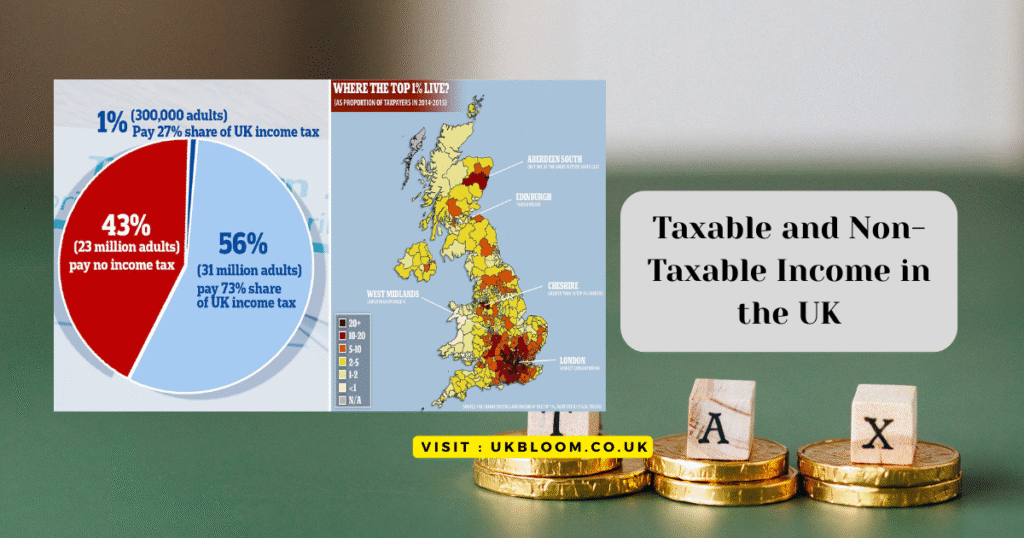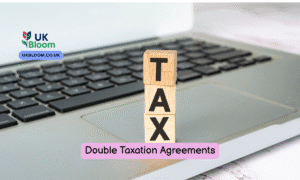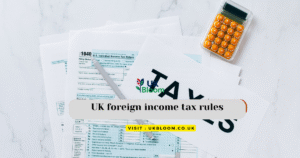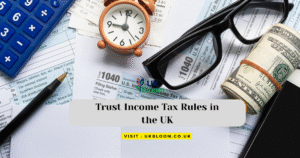Taxable and Non-Taxable Income in the UK
Understanding which types of income are taxable in the UK is essential for accurate financial planning and tax compliance. HMRC has strict classifications that determine whether money you receive is subject to income tax or exempt.
Disclaimer: This article is for informational purposes only. Always consult the UK Home Office or a qualified tax adviser for personalized advice.
Table of Contents
What Counts as Taxable Income in the UK
Taxable income refers to any money or benefit you receive that is subject to income tax under UK law. HMRC assesses tax liability based on your total income during the tax year, including employment, pensions, rent, and more.
Employment Income
If you’re employed in the UK, nearly all earnings from your job are taxable, including:
- Salaries and wages
- Bonuses and commissions
- Overtime pay
- Tips and gratuities
- Reimbursed expenses not exempt under HMRC rules
- Company car or van benefit (BIK)
- Private medical insurance provided by employer
These earnings are taxed under PAYE (Pay As You Earn), where your employer deducts income tax and National Insurance before paying you.
Learn more: Taxable employment benefits
Self-Employment Income
Self-employed individuals must report all profits from their business or freelance work. Tax is paid on:
- Income from services or goods sold
- Consultancy fees
- Online sales or digital work (e.g. Etsy, Fiverr)
- Side hustles and gig economy jobs (e.g. Uber, Deliveroo)
Allowable business expenses can reduce your taxable profits. You must file a Self Assessment tax return annually.
More info: Self-employed income tax rules
Pensions and Retirement Income
The UK taxes most pension income, including:
- State Pension (if total income exceeds Personal Allowance)
- Private pensions
- Occupational or company pensions
- Annuities
- Drawdown income
25% of your pension pot may be withdrawn tax-free, but the rest is taxed at your marginal rate.
See: Tax on pensions
Savings and Investment Income
Taxable:
- Interest from savings accounts (after the Personal Savings Allowance)
- Dividends from shares (after the Dividend Allowance)
- Investment trust income
- Bond interest (except certain government bonds)
Allowances:
| Allowance | 2025/26 Limit |
|---|---|
| Personal Savings Allowance | £1,000 (basic rate) / £500 (higher rate) |
| Dividend Allowance | £500 per year |
Visit: Tax on savings and investments
Rental Income
Income from renting out property (residential or commercial) is fully taxable. You must declare:
- Rent payments
- Non-refundable deposits
- Cleaning fees paid by tenant
- Holiday let income (e.g. Airbnb)
Allowable expenses can offset tax: mortgage interest (limited), insurance, repairs, agent fees.
More: Property Income Tax Guide
Capital Gains
Profits from selling assets (property, shares, crypto, etc.) may be taxed under Capital Gains Tax (CGT). Applies if gains exceed the Annual Exempt Amount (£3,000 in 2025/26).
| Asset Type | Basic Rate | Higher Rate |
|---|---|---|
| Shares | 10% | 20% |
| Property | 18% | 28% |
You must report and pay CGT within 60 days if selling UK residential property.
More: Capital Gains Tax
State Benefits That Are Taxable
Some government benefits are taxable, including:
- State Pension (above Personal Allowance)
- Jobseeker’s Allowance (JSA)
- Carer’s Allowance
- Employment and Support Allowance (contributory)
- Bereavement Allowance
Tax is usually collected via Self Assessment or PAYE depending on other income sources.
Full list: Taxable state benefits
Non-Taxable Income in the UK
Not all income is taxable. Examples include:
- Certain government benefits
- Lottery and gambling winnings
- Gifts (not part of inheritance)
- Most scholarships and student loans
- Compensation for personal injuries
- Child Benefit (unless affected by High Income Child Benefit Charge)
Understanding exemptions can help you avoid overpaying tax.
Gifts and Inheritance
Gifts received are generally not taxable as income. However:
- Inheritance Tax (IHT) may apply on the donor’s estate if they die within 7 years of making large gifts.
- Gifts into trusts may also be taxable.
See: Inheritance Tax and gifts
Lottery Winnings and Gambling
All winnings from gambling, betting, or lotteries are tax-free in the UK, including:
- National Lottery
- Horse racing
- Casinos
- Online games and bingo
However, interest earned on invested winnings is taxable.
Child Benefit and Other Family Payments
Child Benefit is non-taxable unless your or your partner’s income exceeds £60,000, triggering the High Income Child Benefit Charge (HICBC).
Other tax-free family payments include:
- Maternity Allowance
- Sure Start Maternity Grant
- Guardian’s Allowance
More: Child Benefit and HICBC
Student Finance and Scholarships
These are not taxable:
- Tuition fee loans
- Maintenance loans
- University scholarships and bursaries
- Disabled Students’ Allowance
However, paid internships or grants linked to work may be taxed.
More: Student money and tax
Exempt State Benefits
The following benefits are not subject to tax:
- Universal Credit
- Disability Living Allowance (DLA)
- Personal Independence Payment (PIP)
- Attendance Allowance
- Winter Fuel Payment
- Housing Benefit
- Income Support
See full list: Tax-free state benefits
Foreign Income Rules
If you’re a UK tax resident, your worldwide income is taxable, including:
- Overseas salaries
- Foreign property income
- Dividends from non-UK companies
- Interest from offshore accounts
Non-residents pay tax only on UK-sourced income.
Check: Foreign income rules
Income from Trusts and Dividends
- Discretionary trusts may distribute income to beneficiaries, which is taxable at their marginal rate.
- Dividends above the Dividend Allowance (£500) are taxed at:
- 8.75% (basic)
- 33.75% (higher)
- 39.35% (additional)
More: Trust income tax rules
Reporting Requirements
You must declare taxable income using:
- PAYE for employed individuals
- Self Assessment for self-employed, landlords, or those with foreign income
- Report capital gains via HMRC within set deadlines
Late filing or incorrect declarations can result in fines and interest.
Guide: How to file your tax return
Internal Resources on UKBloom
- UK Income Tax Calculator
- Skilled Worker Visa Financial Requirements
- Cost of Living in the UK calculator
- Capital Gains Tax Guide for Expats
© This article is free to use with attribution. Reproduction without crediting UKBloom.co.uk will result in copyright violation.






